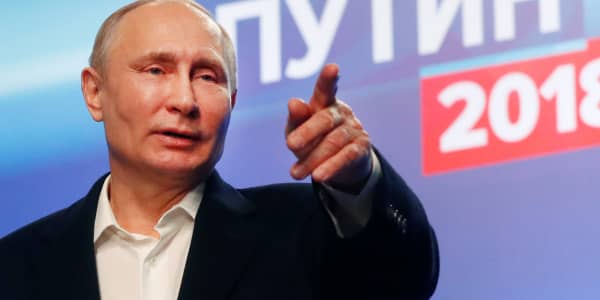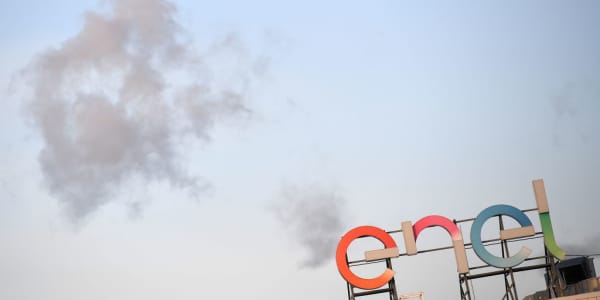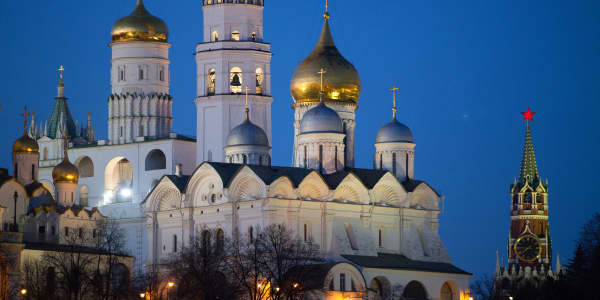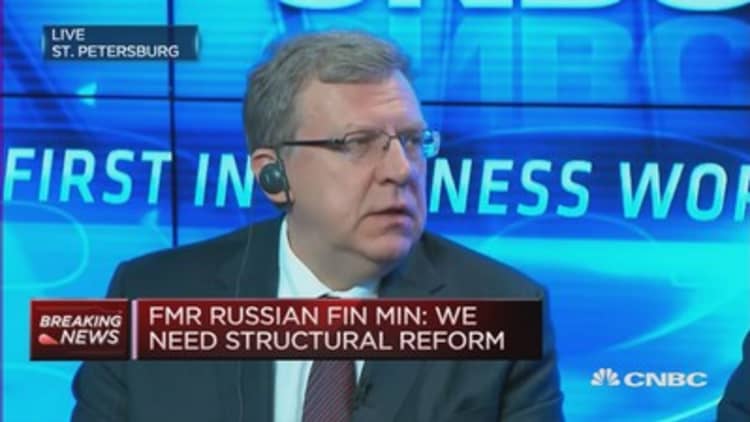
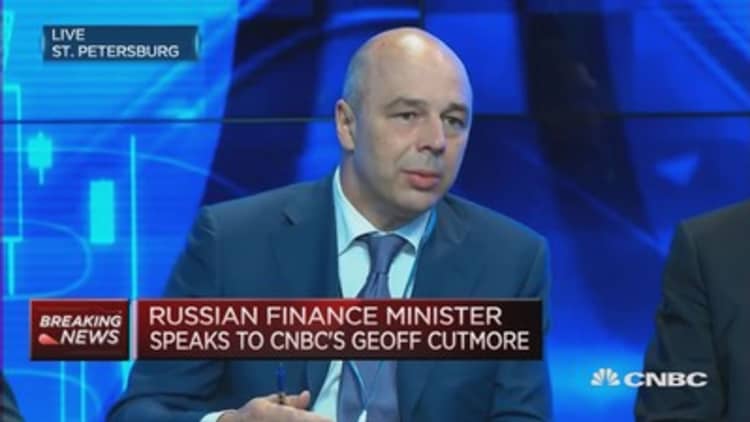
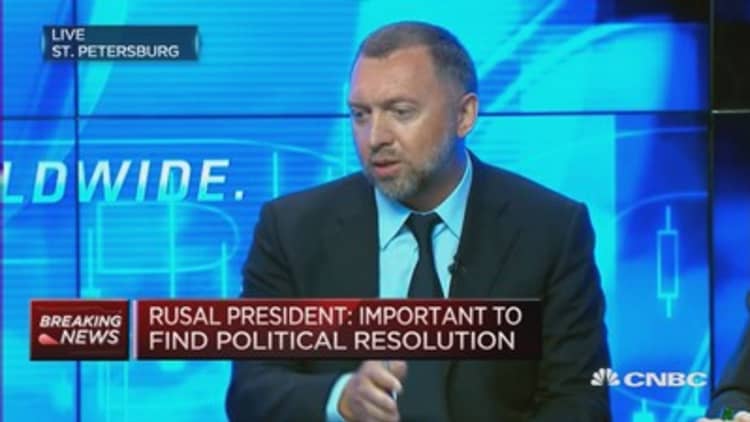
Russia faces a series of challenges and should use its current period of economic crisis as an opportunity to make far-reaching reforms, Russia's political and business leaders have told CNBC at a panel at the St. Petersburg International Economic Forum (SPIEF).
Hosted by CNBC's Geoff Cutmore, the panel met to discuss the topic "Never let a good crisis go to waste". Those taking parts in the session looked at how Russia could use its current crisis to address underlying structural economic problems and implement reforms so it can ultimately return to sustainable economic growth.
Last year's fall in oil prices and international sanctions on the country due to its annexation of Crimea and role in the conflict in Ukraine (which it denies) precipitated economic turmoil in the country, with the ruble losing half its value against the dollar, soaring inflation and capital outflows as investors ran for cover.
Russia's political and economic isolation could be an opportunity for the country to sort out its deeper structural problems, the CNBC-hosted panel of Russian government representatives and business leaders told the SPIEF audience.
Great challenges
Former Finance Minister Alexei Kudrin summed up Russia's problems succinctly, telling the audience that Russia faced "serious challenges."
"We have difficulties with the pension system, with the labor market which actually brings down the rate of development and we have a very bad structure of the budget and we don't spend much money on infrastructure. Our regions do not have enough resources and they've actually stopped investing," he said.
Kudrin explained that Russia had a great challenge to implement a new economic model that was "not dependent on oil prices…and to start economic growth we need to reform."
Earlier Friday at SPIEF, Economy Minister Alexei Ulyukayev said Russia's economy contracted by 3.2 percent in the first five months of the year, citing a preliminary estimate. The minister also said that he expected the contraction in the second and third quarters of 2015 to be around 3.5 to 4 percent.
Speaking at the CNBC panel, Ulyukayev said Russia's potential growth "was not very high."
"We very much believe that by the end of the year we will pass by the recession time and by next year we will be closer to potential growth, but that is only around 2 percent of gross domestic product (GDP). It's still lower than the average in the world, which is around 3.5 percent. (But) we want Russian growth higher than average."
Read MoreCan Russia'seconomic forum revive its fortunes?
However, he said that the Russian government was enacting deregulatory measures to support the economy and Russian businesses. "We still believe in the market and we are trying to support the market fundamentals."
Opportunity knocks
Russia's growth outlook for this year might not look rosy but the country is expected to return to positive growth in 2016. The ruble has also strengthened against the dollar from the lows seen at the start of the year and the rate of inflation, albeit at a high 15.8 percent in May, is slowly decreasing.
On Monday, Russia's central bank announced the fourth consecutive cut in interest rates, reducing its key interest rate to 11.5 percent, in a bid to stimulate growth in the economy.
Inflation remains high, however, at 15.8 percent in May which is preventing the bank from cutting rates at a fast pace.
Whether the bank is cutting rates fast enough is a matter for debate, however. Speaking on CNBC's panel Friday, Russian Finance Minister Anton Siluanov said Russia needed lower interest rates.
Read MoreRussia sanctions helping businesses to thrive
"We need interest rates to be brought which will make credit more accessible which is badly needed now. We have an advantage now after the devaluation of the ruble and the price of our costs going down, labor becoming cheaper and the economy becoming more attractive but what we need is resources – internal ones because we are being deprived of external ones."
He warned that Russia had to keep a grip on its spending, however, and needed "a new quality of growth based on investment not on current consumption."
Not all doom and gloom
Russian business leaders taking part in the conference were eager to point out that Russia's economy was not as gloomy as it is often depicted by the international media.
Mikhail Shamolin, the head of investment giant Sistema, told the panel that in his company, which has invested in 17 sectors, 16 sectors make money.
"The gloomy picture often depicted of the Russian economy, from our perspective, is not really true. There are business opportunities in Russia and businesses do develop, regulation is improving and we as an investor intend to stay in Russia and we see opportunities (here)."
Shamolin was keen to see more opportunities for investment and privatization as "that could help resolve the issue of productivity and the number of jobs that produce value."
Oleg Deripaska, president of aluminium giant Rusal, told the panel that Russia was in a period of transition, rather than crisis although he insisted "a political resolution" to issues like Ukraine was needed.
"There are some areas where we can see tremendous progress- such as in taxation, but I would say that markets in Russia are looking for more points of equilibrium after the shock of sanctions…But it's important to define what will be our new model of economic growth and how we promote the market economy."
In order for Russia to return to growth, a number of guests on CNBC's panel and high-profile members of the audience participating in the debate, such as the chairman of PwC International, Dennis Nally, noted that the government needed to make efforts to understand the needs of its business community and to encourage them to invest again.
That perspective was echoed by Christopher Pissarides, professor of Economics at the London School of Economics (LSE) in London – who said that Russia's young generation needed to be encouraged to create businesses.
CNBC's panel of guests was made up of Anton Siluanov, finance minister of the Russian Federation and Alexei Ulyukayev, minister of Economic Development were joined by Alexey Kudrin, former Russian finance minister and Andrey Makarov, chairman of the Russian government's Committee on Budget and Taxes.
Among the Russian business leaders on the panel were Oleg Deripaska, head of aluminum giant Rusal, Kirill Androsov, managing director of Altera Investment Fund, Mikhail Shamolin, president and chief executive of Russian investment giant Sistema and Oleg Viyugin, Chairman of the Board of Directors of MDM Bank.
- Written by CNBC's Holly Ellyatt, follow her on Twitter @HollyEllyatt.




